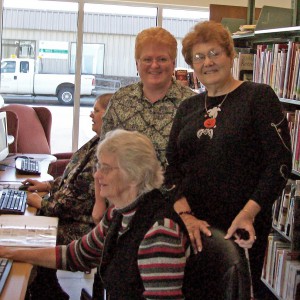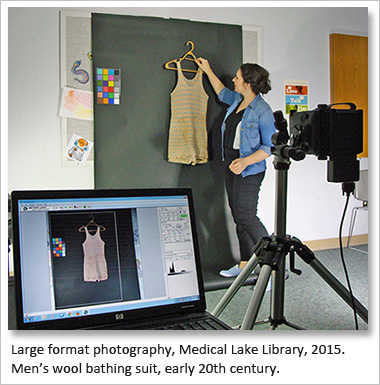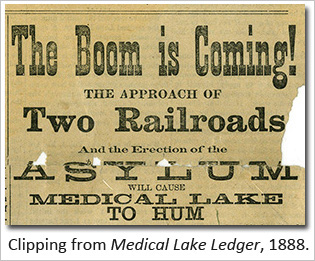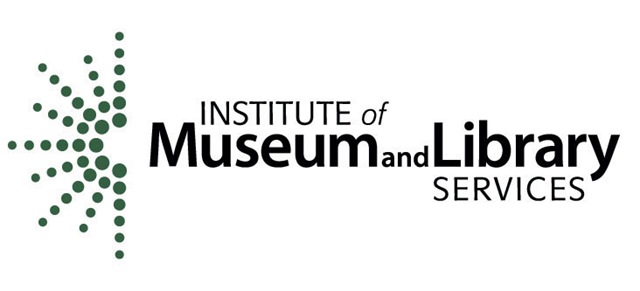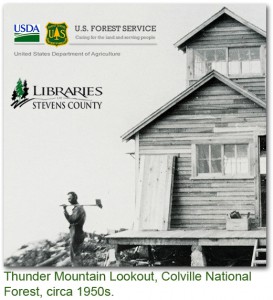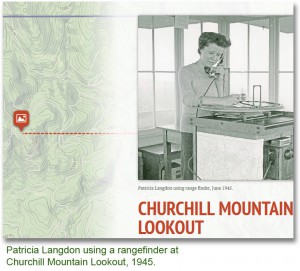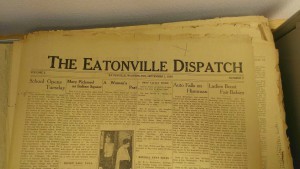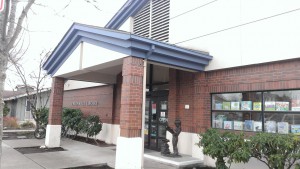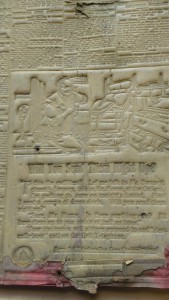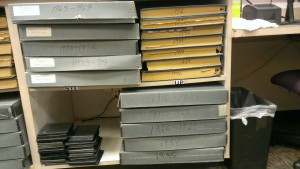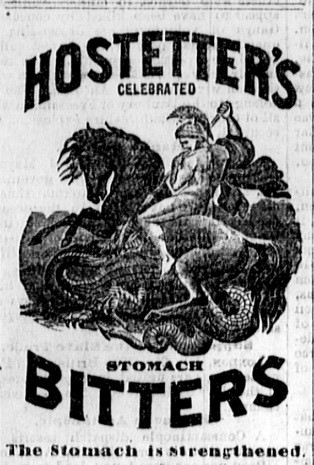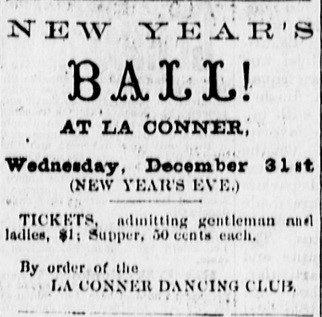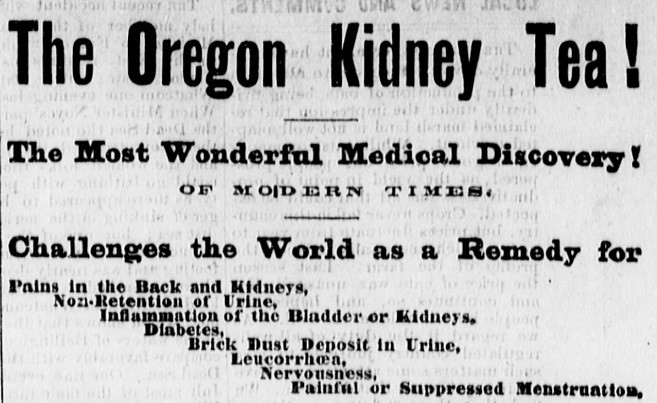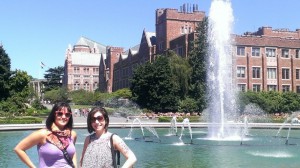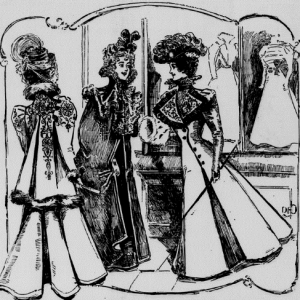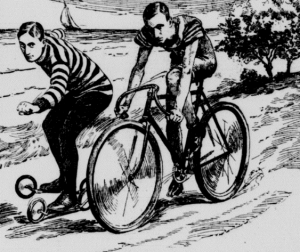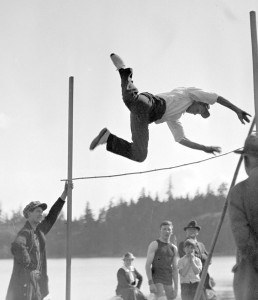From the desk of Marlys Rudeen.
While looking through issues of the Newport Miner for 1907, I came across the following quote – “Poor old Spokane has had to bow to the inevitable, and beginning next Sunday the lid will be jammed down so hard that visitors will hardly recognize the town. Mayor Moore has issued an order calling for the closing of all saloons on Sunday and abolishing the notorious cribs and concert halls.” Jan. 9, 1908, p. 5
As I was born and raised in Spokane this seemed odd to me – I hadn’t noticed that it was particularly depraved (though since we moved when I was only 14 that may explain my not noticing.) Still, I wondered so I started looking through some early issues of the Spokane Press, Nov.-Dec. 1902, and started looking for the seedier side of Spokane. It turns out there was lots going on.
You can explore the Spokane Press for Nov. 1902-1910 at the Chronicling America web site Choose the Browse Issues link, select a year from the drop down box, and then choose an issue from the calendar display. I’ve listed some of the dates and pages below for some interesting tidbits.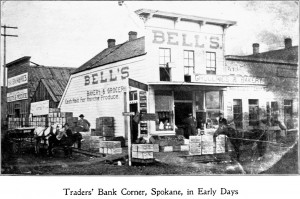
Nov. 10, 1902
p. 1 “Buncoed Out of Three Thousand” H. E. Gower, a recent arrival from Wisconsin was in town for business and at the train depot to return to Missoula. A man approaches him, saying that he’s from the same county in Wisconsin. He invites Gower to go with him to a friend’s place to see pictures of the Klondike. When they arrive the friend is absent, but there’s a card game in progress. Gower loans his new friend some money and then takes his place for a few hands when his friend has to go out for a bit. “They had all my money in about five minutes. I don’t know what the game was, except that it was cards.” (No mention is made of what they were drinking, but given that Gower couldn’t remember what game he had been playing or where he had been playing it, one has to wonder if a bottle was involved.)
Nov. 12, 1902
p. 4 “Charges His Friend With Embezzlement” Lyndon M. Hall files a complaint with the police to the effect that George O. Scraggs has swindled him out of $100. Mr. Hall wished to mail his certificate of deposit received as wages to his bank. He wrote the letter, endorsed the certificate and enclosed it. His friend, Scraggs, offered to drop it off at the Rathdrum post office for him. Instead, Mr. Scraggs boarded a train for Spokane in Rathdrum. “He landed there in the evening and going to ‘Doc’ Brown of the Owl, it is said, presented the endorsed certificate … when the arrest was made he was broke.” (The Owl is only one of the well-known saloons and gambling establishments in town, others are the Stockholm, the Coeur d’Alene, the Combination, and the O.K. The moral for both Mr. Gower and Mr. Hall seems to be that they should be a great deal less trusting.)
Nov. 14, 1902
p. 1 In “Spokane Gamblers are Out of a Job,” several of the largest gaming houses are raided and all gambling equipment seized. But the houses had gotten word of the raids and “the results of the Sheriff’s haul were not the handsome roulette, faro and other tables… but what the doughty sheriff did capture was several wagon loads of old furniture, musty with long lying in secluded cellars where it had possibly awaited just such an occasion.” Prominent patrons of the establishments hold the opinion that it will all blow over and the games will be back in a month.
p. 4 “War is being Waged on Buncoes.” Chief of Police Reddy asserts that his able constables and detectives are doing their best, but that “ a few high-collared gents, wearing good clothes, well-addressed, will land in town and before the police or detectives can locate them it is possible for the bunco man to hypnotize a victim and relieve him of his cash…”
Nov. 18, 1902
p. 1 The formation of an “Anti-Vice Party” is announced in anticipation of the next municipal election. It will be “pledged to wage war on Spokane’s gambling houses and all resorts of vice.” Rev. George Wallace of Westminster Presbyterian Church rejects the claims that the gambling houses “are a source of revenue which yearly brings thousands of dollars into this city…”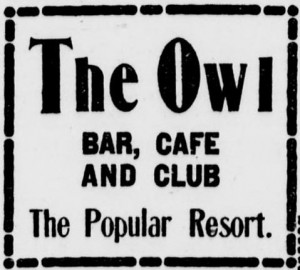
Nov. 22, 1902
p. 1 “Saloon Men Willing to go to Jail in Defense of What They Believe to be Their Rights.” A controversy arises about the presence of slot machines in gambling houses. Evidently a law has been passed barring the use of “cash-paying slot machines” but not other forms of gaming or equipment. The saloon owners, especially the smaller ones have hired attorneys (the firm of Nuzum & Nuzum) and plan to make a stand. (A follow up article is in the Nov. 24, 1902 issue on p. 1.)
p. 2 “Alma Arrested” is the first small article referring to the Stockholm Saloon and its cast of characters. Alma Green is arrested and charged with having drugged and robbed John Johnson. Johnson is also arrested for drunkenness, and now claims that his name is actually Charles Jameison.
p. 3 “The Wide-Open Town” The paper, in response to the new Anti-Vice party, has found two men, a pastor and the proprietor of the Owl, to write opposing columns, both for and against the “Proposed Movement for the Suppression of Vice.”
Nov. 29, 1902
p. 1 “Stockholm Case Dismissed…” In the matter of Alma Green and Charles Jamieson, the judge throws the case out for insufficient evidence. Jamieson is still claiming he was drugged and robbed. He also asserts that the Stockholm’s owner Gust Pearson threatened him if he testified. The defense asserts that Jamieson was very drunk and spent all his money on whiskey.
Dec. 3, 1902
p. 3 “Council – Has Warm Session over Stockholm License” The Chief of Police has lodged a complaint against the Stockholm saloon and variety theatre, and its owner, Gust Pearson. There is some conflict due to the fact that the complaint lists no direct evidence of the charge and is sent back to the police. Police Commissioner Lilienthal and the licensing committee advises the council to investigate.
Dec. 8, 1902
p. 1 W. S. Green who had been a “special officer” at the Stockholm saloon, applied for an arrest warrant for – Police Commissioner Lilienthal! Charges are malfeasance of office and allowing open gambling operations in Spokane. (It seems odd that an officer who had worked in a saloon is all that disturbed about this issue.)
Dec. 9, 1902
p. 1 Commissioner Lilienthal surrenders at the court house offers bond and is released to continue his duties. The corporation counsel make the argument that Lilienthal cannot be prosecuted under the cited statute since it concerns state and county officials and he is a municipal officer. Under “Bunco Man,” the arrest of “Swede Sam” is reported. Sam is charged with removing considerable money from a young man from Pendleton.
Dec. 10, 1902
p. 1 The case against Commissioner Lilienthal is dismissed among a flurry of lawyers, objections and affidavits. In a related development – “May Arrest Kimball”- S. W. Green is securing an arrest warrant for Prosecuting Attorney Kimball, also on a charge of malfeasance of office. (He’s on a roll.)
“Lawyers Determined” The law firm of Nuzum & Nuzum representing the saloons in the slot machine case is determined to take the case to the superior court and to the supreme court if necessary.
p. 2 “Interprets His Duty” Mr. Green, he of the arrest warrants, attempted to explain his concept of duty. While he was a special officer at the Stockholm he was stationed there by the city but in the employ of and paid by the saloon. “He says his interpretation of his duty was that he was to protect the patrons and the house from crime and disorder and this he endeavored to do faithfully.”
Dec. 12, 1902
p. 1 The city council will be hearing complaints against the Stockholm and its owner, Gust Pearson.
Dec. 15, 1902
p. 1 “Wants Two Theatres Licenses Revoked” Fred D. Studley is charging that the Comique and the Coeur d’Alene theatres have violated their licenses by employing women in their saloons “to encourage immoral conduct, and gambling contrary to good morals.”
Dec. 16, 1902
p. 1 Swede Sam is fined for “being found with implements with which to make loaded dice.” 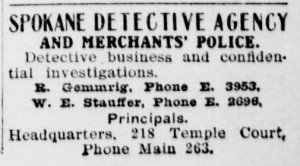
Dec, 17, 1902
p. 1 The city council messes about with the charges against Gust Pearson, the Stockholm, the Comique and the Coeur d’Alene. Everything scheduled for next week. In the superior court a judge refuses to issue search warrants for five gambling houses as the initial complaints were made in the justice court rather than the superior court.
Dec. 18, 1902
p. 3 “Stockholm Inquiry” The city council hears the case against the Stockholm. “Eric Linden and a man named Patterson said they had been robbed in the place. Captain Coverly testified on the reputation of the place, and Officer Miles described the ways of its habitues.” The case was continued.
p. 4 “Gambling among the Women of Spokane” describes the habits of the ladies in town, asserting that “Spokane has some of the gamiest women to be found anywhere.” (I don’t think that means the same thing anymore.)
Dec. 20, 1902
p. 1 The city council takes on the Stockholm case once more and first several officers testified to the saloon’s unsavory reputation. Then they hear the defense – the bar’s ‘special officer’ and the night bartender testified that Charles Jamieson had spent all his money on booze and had not been robbed. Two of the establishment’s ladies testified that they were expected to obey rules of conduct. For instance there is a rule about not sitting in men’s laps. “Mr. Pearson doesn’t like it.”
Dec. 22, 1902
p. 1 “Stockholm Resort Sells Soft Drinks” The city council has revoked the liquor license for the Stockholm. They continue to draw a crowd.
Dec. 24, 1902
p. 1 “Lilienthal talks on the Theatre Cases” It seems the cases against the Comique and Coeur d’Alene have been dismissed. He notes that “The witnesses produced by the complainant were all employees of the Stockholm.”
Dec, 25, 1902
p. 3 In “How Gamblers in Spokane Spent Merry Christmas Eve” a reporter comments on the crowds that spent the evening wandering from one resort to another “in an ever unsatisfied desire to find excitement.” In “Straight House” Gust Pearson asserts he will make more money without serving liquor than he did with it. “If patrons of the place insist on having liquor the only way for them to get it is to have it sent in from one of the neighboring saloons.” (An ingenious work-around!)
The Spokane Press was digitized through a grant from the National Endowment for the Humanities under the National Digital Newspaper Program. The Press and many other American newspapers can be found online at Chronicling America at the Library of Congress.
Additional newspapers for Washington can be found at Historic Newspapers at the Washington State Library’s web site. The State Library is a Division of the Office of the Secretary of State.






